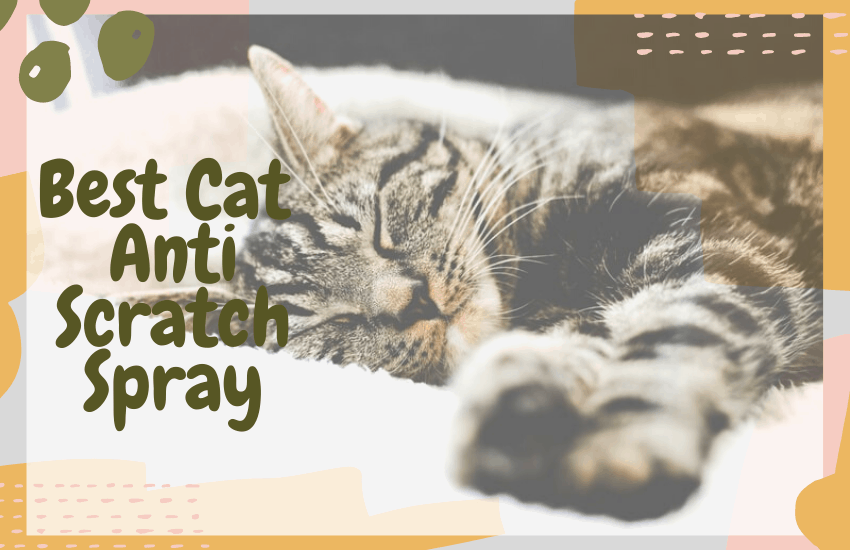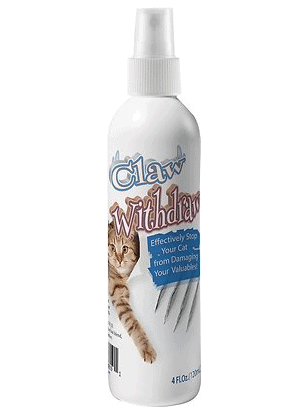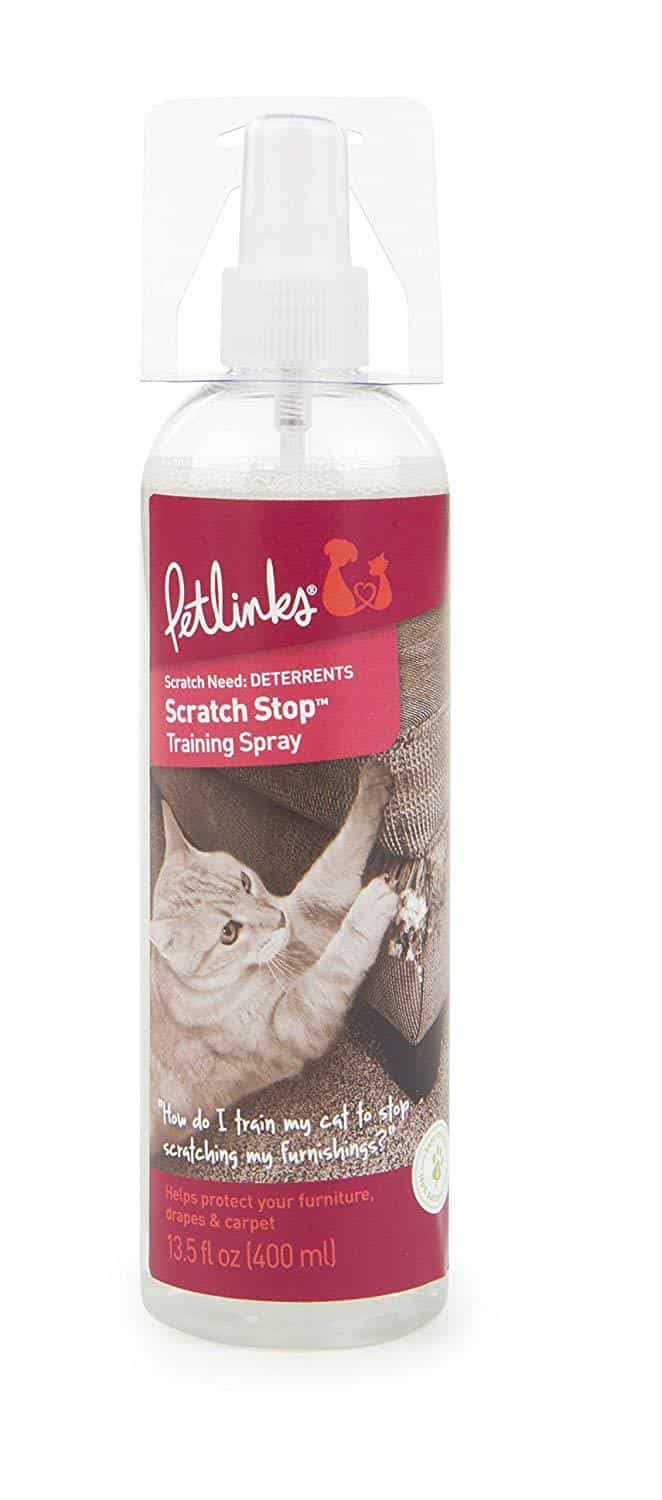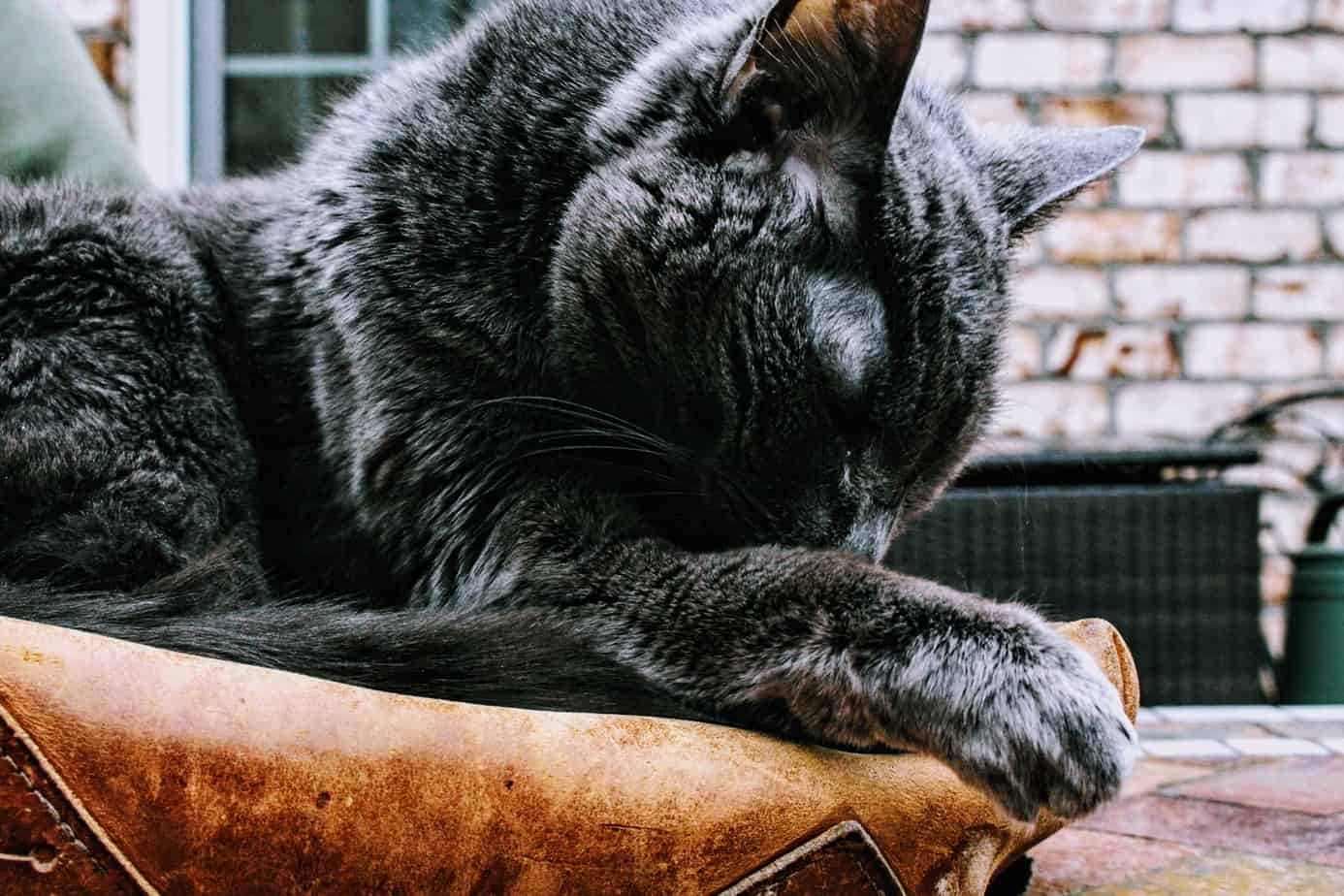
Cats scratch. It’s something that they all do, no matter what breed, no matter how old, no matter whether they are an indoor or an outdoor cat; they all scratch. Although that’s a good thing for them (we’ll go into why this is in a moment) it’s rarely a good thing for your furniture, carpets, curtains, and even walls.
A cat’s claws are incredibly sharp and can shred wallpaper, wood, and fabrics within moments, leaving you with evidence that your cat has been there; evidence that you either have to learn to live with or spend money to fix everything (good luck with that leather furniture!).
So what’s the best cat scratch deterrent?
There are many different anti-scratch cat repellent sprays on the market; here are some to choose from that will work well for your cat and save your belongings from being scratched.
Table of Contents
Claw Withdraw Cat Scratch Spray Deterrent

The Claw Withdraw anti-scratch spray is a completely natural and safe way to ensure that your cat no longer scratches where they aren’t supposed to.
The spray creates an invisible natural cat repellent shield around anything you don’t want your cat to destroy and make it difficult for your pet to make any changes. As a result, they will soon look elsewhere (hopefully their scratching post) instead.
Made with an herbal blend of rosemary and astragalus with pure, deionized water, this all-natural formula has a scent that works to repel kitties from areas where they like to scratch, with no harsh ingredients or chemicals.
Petlinks Scratch Stop Spray Deterrent

Natural, safe, and long-lasting, the Petlinks formula is designed to ensure that your cat stays away from areas that you don’t want them to scratch – it’s ideal for training your cat too, helping them to understand what they can and cannot scratch.
This spray is formulated with a botanical blend of naturally-sourced lemon and eucalyptus oils that humans love but kitties just hate. It works by repelling your furry one from scratching your furniture, drapes and carpet.
Pet MasterMind Lion Tamer No-Scratch Cat Spray
This non-toxic formula is plant-derived and designed to help stop your cat from scratching your carpet, couch or anything else she might get her claws on. Simply spray the affected areas and point your paw-tner in the direction of her scratching post instead.
Lion Tamer spray is a non-staining formula spray bottle that will protect your precious items from your cat’s claws. This spray smells lovely to humans but cats don’t enjoy the scent at all (cat deterrent) and will stay away from the area in which they find it. It’s perfectly natural, derived from plants, so no harm will come to your cat or your furniture (furniture spray).

Why Cats Scratch
Why is it that cats love to scratch everything they can get their claws onto (and into) in our homes? Cat scratching serves a number of different functions. The first– and potentially most important– is that scratching keeps a cat’s claws sharp. Claws are a cat’s first line of defense against predators, as they are their weapons for hunting. Without their claws, a cat may find that they are vulnerable to attack – even a house cat needs to have their claws in order to feel safe.
Cat scratching is also a way of marking territory. When a cat scratches something it leaves behind scent marks; sweat is secreted between a cat’s paw pads and when it scratches that sweat is left on the item in question. This is another way of defending the cat’s territory; the physical scratch marks are a kind of ‘keep away’ signal to anything that might be tempted to come in and take the territory for its own. Of course, this is far less likely to happen in a domesticated situation, but a cat’s nature can’t necessarily be changed after hundreds of thousands of years.
Wood is an excellent material for your cat to scratch; it’s just the right texture to pull off the old, outers sheath of the claw and reveal the new one beneath.
All your cat needs to do is dig in and pull down and the job is done. Take a look at somewhere your cat scratches regularly and you should be able to see the claw sheaths there. This is why it’s critical to have an excellent cat repellent on hand, especially for new (untrained) cats.
Why Scratch In The House?
If cats love to scratch wood so much, why do they scratch other items in the house? Why scratch in the house at all when wood grows outside and they can take their pick? If you can determine why your cat is scratching where it is choosing to scratch you might be able to work out the best solution for the problem.
Claw Exercise
If you own an indoor cat they will still need to scratch – their claws need to be kept sharp and clean for comfort. If there is nothing that is as suitable as a piece of bark would be, your cat will need to compromise and find something else. They will find something that works for them, and it may take them some trial and error.
If there is no appropriate wood surface for your cat, take a look carefully around your home and you might discover tiny scratch marks in various places. This is where your cat has experimented with finding the right place to scratch. If they didn’t like it, they will have moved on to somewhere else, but the evidence of their experiment will be there if you look closely.
A cat will need to exercise its claws to keep them strong and to ensure that they can be used if necessary. Although you will protect your cat from most predators, especially if they are kept indoors, they will want to feel safe in the knowledge that they can help themselves too.
Enjoyment
Some cats simply enjoy the feeling that scratching certain materials can give them. Carpet, for example, might feel great to some cats, so they continue to scratch it even if you have given them a wonderful scratching post to play with. They might even continue if they have access to the great outdoors and all the trees they want.
Scratching can also become a habit over time and your cat might not even realize that they are doing it. This is one of the easiest reasons to solve.
Curiosity
Cats love to explore the world around them, especially if something new comes into their home. If this is the case, marking it with their scent seems like a great idea to them. ‘New’ to a cat might not be new to a human, however. For example, a piece of wallpaper that starts to peel off the wall could seem like a new and exciting toy to a cat – one that just has to be played with and tested out. Pulling a piece of this wallpaper will result in either a feeling that the cat enjoys or more ‘questions’ in the cat’s mind. Plus, a cat will have the bonus of gaining their owner’s attention (even if it is in an angry way).
Communication
If there are other cats around, some cats will scratch more. Although we don’t understand exactly what message they are trying to send, it could be a territorial display, showing other cats what belongs to them and telling them not to come too close. They will be leaving a scent mark behind, so this theory makes sense.
Security
If a cat is feeling vulnerable they will place their scent on as many places as they can to make themselves feel safer again. They may also go as far as to spray, but in most cases, it seems that scratching is enough. If your cat is feeling worried and stressed you will notice that more and more areas in your home become scratched, particularly ones that are close to doorways or spots where your cat thinks attacks could happen.
How to Stop Cats from Scratching
Firstly, it’s important to remember that scratching in the house is not your cat’s fault – they are not deliberately choosing to deface your furniture and upholstery. They are simply doing what is natural for them. So here are some solutions that might help to save your furniture and your relationship with your pet.
Give Them A Scratching Post
If you can provide your cat with something solely for their use that will sharpen their claws then you should do so. This is particularly important if your cat is an indoor one with nothing ‘natural’ to scratch on. A scratching post that has toys hanging from it should catch their attention and keep them occupied too.
When you bring the scratching post home, place it in front of the area that has seen the most damage from your cat. Gently take your cat and wipe their paws down the post – this puts their scent on it. It also shows the cat what they should do with the post once they have it.
When you notice your cat scratching anything other than the post, pick them up and take them to it – and show them again what to do. Eventually, they will realize that this is where they should be scratching and nowhere else. This is actually a fairly easy way to train your cat.
If they are being stubborn, sprinkle some catnip on the post to entice them.
Exercise Your Cat
If your cat is scratching your furniture because they are bored or want attention, you will need to give them something to do. Play regularly with your cat and they should stop their scratching habits. Alternatively, confine them to the outdoors or to a scratching post. Just a few times a day for five or 10 minutes at a time is enough to keep your cat happy and occupied.
Improve Security
If your cat is scratching because they feel insecure you will need to find the source of their problem and remove it if possible. It could be other cats in the area or a fear of something that they came across when outside, such as a car or dog. They may feel that these scary things could come into the house, and therefore they need to protect it.
To help with this problem you can get a catflap that only lets your own pet in and out. Alternatively, you can forget the catflap altogether and let the cat in and out yourself.
Giving your cat somewhere high up to rest and feel safe is also a good idea; this can be combined with a scratching post as well. Restricting access to most of the rooms in your home may also work; if a cat only has access to two rooms, for example, they may feel much more relaxed and secure.
Why not put your cat’s scent around your home for them? All you need to do is use a soft cloth to wipe around your cat’s face and then rub it around your home so that no matter where they go they feel safe and secure.
For those areas that your cat regularly scratches, make sure you clean them well. This will remove your cat’s scent from the area so they won’t be attracted back to the same spot.
Finally, you can use anti-scratch sprays around your home to deter your cat from marking in certain areas.
Made with an herbal blend of rosemary and astragalus with pure, deionized water, this all-natural formula has a scent that works to repel kitties from areas where they like to scratch, with no harsh ingredients or chemicals.




